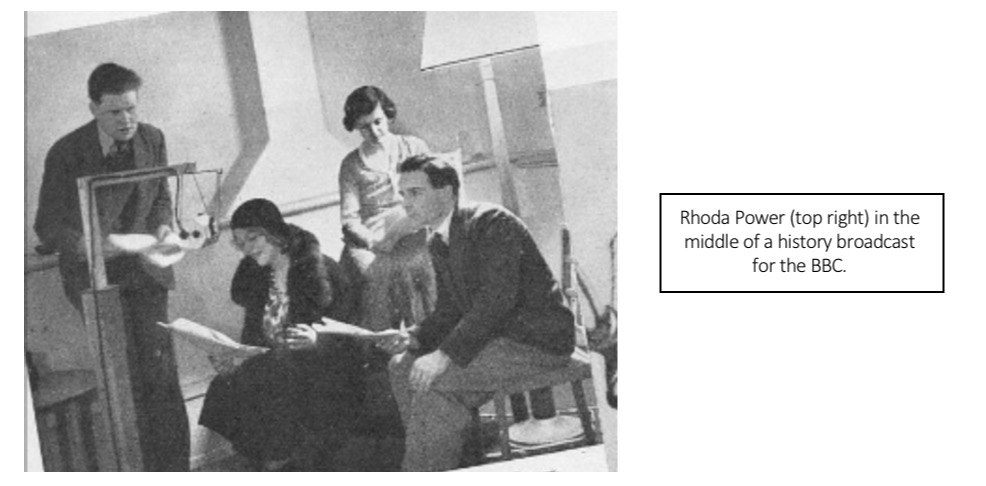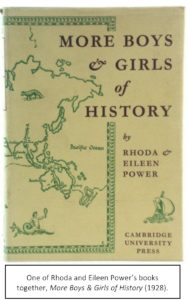Early Graduates as Authors and Broadcasters: Annie M’Killiam and Rhoda Power
For those of the first women History graduates who hoped to use their historical learning in a career of some sort, there were relatively few options in the early twentieth century. There were very few jobs for women in universities, except in women’s colleges. Some went into school teaching (and sometimes, later, to university jobs). And some pursued a career as authors, including two early women graduates of St Andrews, Annie M’Killiam and Rhoda Power.
Annie Edie M’Killiam graduated with an Ordinary MA degree in History in October of 1909. Early biographical details on her are scarce, but we know she was born in 1871, spent most of her life in Aberdeen, and died relatively young—at least before 1920. However, we do know that shortly after her graduation, she wrote and published several historical textbooks under the name A.E. M’Killiam.
She wrote two biographies, one on Alfred the Great and the other Charles the First, as well as several chronicles on English and ecclesiastical history; these were all published before 1920. It is clear by her body of work that she approached history through individuals or characters, whom she calls in one of her books the “Makers of History”. In another book, A chronicle of the popes from St. Peter to Pius X, M’Killiam laid out her determination to avoid institutional history. Contemporary reviews (all written by men) were not entirely positive about the result, complaining that M’Killiam merely “describes significant events” in the lives of her chosen individuals.[1] Reviewers were dissatisfied with her “maze of contemporary detail” and intimate portraits of her subjects.[2]
Nonetheless, M’Killiam’s career as a history-writer offers interesting insight into the opportunities for early History graduates. She began working with the publisher G. Bell & Sons before finishing her M.A.. M’Killiam had been introduced to this educational publishing company by Sir James Donaldson, then the principal of St Andrews but also a classical scholar. A personal letter from M’Killiam to Donaldson informs us that (despite the negative reviews), her books were selling very well in schools, and she already had orders from the G. Bell and Sons for more books. Although M’Killiam’s career was sadly cut short, the graduate of St Andrews was an accomplished author of general histories whose work featured in many schools’ curricula.
We know more about our second woman author: Rhoda Dolores Power. She was born in 1890, grew up in Oxford, and graduated from St Andrews with a degree in History in 1913. She had a prolific career in mass education and broadcasting. She worked at the BBC, and came to be regarded as the history ‘expert’ of its broadcast lessons from the late 1920s until her death in 1957.
Rhoda worked alongside her sister, Eileen Power, a renowned economic historian and professor at LSE, in broadcasting and producing historical surveys. The majority of her own writing consists of children’s literature inspired by history. Her name appears in countless British newspapers’ daily broadcast schedules. Her readings include “Boys and Girls of the Ages—Gentry, a Little Welsh Princess” (Dundee Evening Telegraph, 10 October 1927) and “Children of other Days—The Middle Ages: The Villein’s Children” (Leeds Mercury, 10 November 1930).

Power’s work in mass education led to an MBE in 1950. One 1935 article credits her as having “perfected a technique for making history live”.[3]
Like M’Killiam, Power taught, wrote, and presented history as if it were a story, with a focus on the daily details of ordinary life. Power read to children about the meals they ate in mediaeval times with “mouth-watering description”, and her history lessons were interspersed with musical interludes and dramatic re-enactments.[4] Her history lessons may even constitute as social history, as one of her programmes in “World History” offered glimpses into the lives of women in ancient Greece, Assyria, Persia, and Egypt. Whilst Power’s main focus did not lie in textbook histories, she contributed greatly to the education of children in the U.K. and pioneered new ways to transmit important history to the masses.

The lives of these two female graduates of St Andrews offer us interesting insight into how women made careers of their education in history despite the restrictions of their academic world. Perhaps their shared interest in the history of everyday historic lives was shaped by their education at St Andrews, but it is more likely they were writing history for those who would listen and read it: younger, general audiences. We can hope their histories led some young women in their audience to follow in their footsteps.
Sources
[1] E.R. Adair, ‘Review of Charles the First by A.E. M’Killiam’, History (1918).
[2] Ibid.
[3] Joan Woollcombe, ‘Moulding the Minds of To-morrow’, Britannie and Eve (1935).
[4] Ibid.
Further Reading
The Scotsman, ‘Deaths’, 3 November 1916
Sir James Donaldson, Woman, her position and influence in ancient Greece and Rome (1907).
David Baird Smith, ‘Review of A chronicle of the popes from St. Peter to Pius X by A.E. M’Killiam’, (1912).
E.R. Adair, ‘Review of Charles the First by A.E. M’Killiam’, History (1918).
Annie M’Killiam, note to Sir James Donaldson (Oct 11 1910).
Ina Zweiniger-Bargielowska, Women in Twentieth-Century Britain (Routledge, 2001).
Laura Carter, ‘Rhoda Power, BBC Radio, and Mass Education, 1922-1957’, Revue Française de Civilisation Britannique (2020).
Jane McDermid, “Intellectual Instruction is Best Left to a Man’: the feminisation of the Scottish teaching profession in the second half of the nineteenth century’, Women’s History Review (1997).
Sunderland Daily Echo and Shipping Gazette, ‘Lessons “Over the Air”: New Features for Young Students. BBC’s Full Programme’, 30 June 1933.
Britannia and Eve, ‘Moulding the Minds of To-morrow’, 1 December 1935.
Photos
Joan Woollcombe, ‘Moulding the Minds of To-morrow’, Britannia and Eve (1935).
AbeBooks, ‘More Boys & Girls of History by Eileen and Rhoda Power’.
